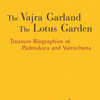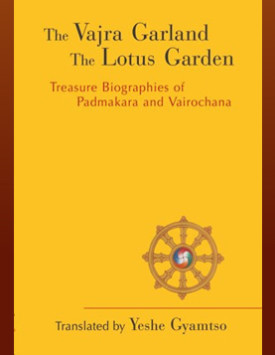
The two biographies translated here are treasures revealed by Jamgön Kongtrül Lodrö Taye, who was an emanation of the translator Vairochana, the subject of the second of the two biographies. Vairochana was a disciple of Guru Padmasambhava, the subject of the first biography. The purpose of these biographies is to inspire the reader.

The Vajra Garland and The Lotus Garden: Treasure Biographies of Padmakara and Vairochana
by Jamgon Kongtrul Lodro Taye, translated by Lama Yeshe Gyamtso
December 2005
ISBN: 0-9741092-6-6
hardcover
5.5 x 8.5 in., 192 pages
$19.95
The two biographies translated here are treasures revealed by Jamgon Kongtrul Lodro Taye, who was an emanation of the translator Vairochana, the subject of the second of the two biographies. Vairochana was a disciple of Guru Padmasambhava, the subject of the first biography. The purpose of these biographies is to inspire the reader. We are encouraged to vividly imagine the deeds of Guru Rinpoche and Vairochana, both so that we appreciate those deeds and so that we understand something of what such beings are. These stories are of people utterly unlike us in one sense and identical to us in another. Nevertheless, all of the qualities demonstrated by Guru Rinpoche and Vairochana are said by them to exist within us right now. We are in no way inferior to them in nature and are therefore potentially capable of doing everything they have done. However, because we have as yet not freed our potential from the limitations imposed on it by ignorance, our present state is very different from their present state. If we were incapable of achieving what these beings have achieved, there would be little point in studying their deeds. At the same time, seeing how extraordinary that achievement is can remind us that we have not yet realized our full potential. Therefore these stories are both uplifting and humbling.
What moves is mind.
Its nature is awareness.
If primordial purity is realized,
They are said to be one.
Wisdom is the primordial purity of consciousness.
When resting evenly,
That abiding in emptiness
Is the recognition of dharmakaya,
The lucidity is said to be sambhogakaya.
The movement nirmanakaya.
Those three are one in the expanse,
If you remain in equality without ever straying,
That exhausting of dharmas,
That transcedence of the intellect,
Is svabhavikayaya.
